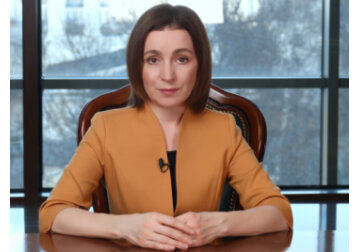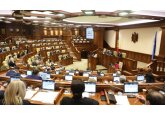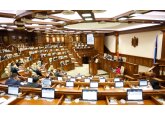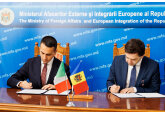
The Moldovan government will develop a resilience building program and an anti-crisis action plan to help the economy and citizens more easily cope with the shock of the war - Maia Sandu.
The President of Moldova stated this in a new appeal to citizens, noting that she instructed the Cabinet of Ministers to develop these documents, and they will include measures to support small and medium-sized businesses, agriculture, people with low incomes. “We need to launch as many national and local infrastructure projects as possible in order to create as many jobs as possible and strengthen the country's resilience. Projects for the restoration of national and local roads, bridges and railway infrastructure, projects for water supply and sewerage systems. In the context of high energy prices, it is very important this summer to invest in energy efficiency projects that will reduce the energy consumption of state institutions and residential buildings, as well as reduce bills,” the head of state said. According to her, support is needed for small farmers to start agricultural work on time and ensure sufficient crops in the face of rising world food prices. More targeted measures are also needed to help the economy and citizens more easily cope with the shock of war. “We can also help each other. Here's a simple example that can make a difference: buying more local produce, such as fresh apples, carefully grown by our farmers who have lost access to markets in the east. In the coming months, we will have to work even harder, and save even more, and be flexible. We will endure - as our parents, our grandfathers and great-grandfathers overcame the troubles and survived. Moldovans have already proved that they know what dignity means, that they can be united - if instead of disunity we choose unity and care for others. And instead of despairing, we will do our duty,” said Maia Sandu. In her address, the head of state acknowledged that the war in Ukraine had hit the Moldovan economy hard, led to higher prices and problems with exports and imports. Moldova lost access to the logistics center in Odessa, from where it received an impressive part of Moldovan imports. Suppliers are forced to look for alternative - and more costly - routes to deliver goods, urgently looking for new business partners to replace the links that have fallen due to the war. An increase in the cost of imports leads to an increase in prices. Exporters have also suffered. Due to hostilities in a neighboring country, problems arose for those who traded in the eastern markets. The use of alternative routes increases already significant fuel and transportation costs, all of which affect the competitiveness of our deliveries. Reorientation to other markets takes time. “Many of our entrepreneurs are in serious trouble. This is not too noticeable, but vile price of war. Military operations lead to unpredictability: we all saw what happened the other day with salt, when a hype arose literally out of the blue. Today, everyone is trying to save money, spend less, plan the family budget more efficiently or form the company's budget. Instead of developing, the economy suffers from shocks,” said Maia Sandu. She drew attention to the fact that Moldova faced several crises at the same time: a pandemic, an energy crisis and rising prices, and the war in Ukraine provoked a new test, and it will affect our country for a very long time and in the most serious way. “In recent weeks, the pandemic seems to be easing, but the energy crisis that began in the fall is creating huge problems: gas prices continue to rise, which means that heating and electricity bills are also rising. Both citizens and businesses suffer. Fuel prices have risen, jeopardizing the spring field work. Prices for other essential goods and services have also increased,” she said. The President noted that we are all going through a period of great trials, and the authorities are looking for the most correct solutions to provide support to citizens and businesses.// 18.03.2022- InfoMarket.







